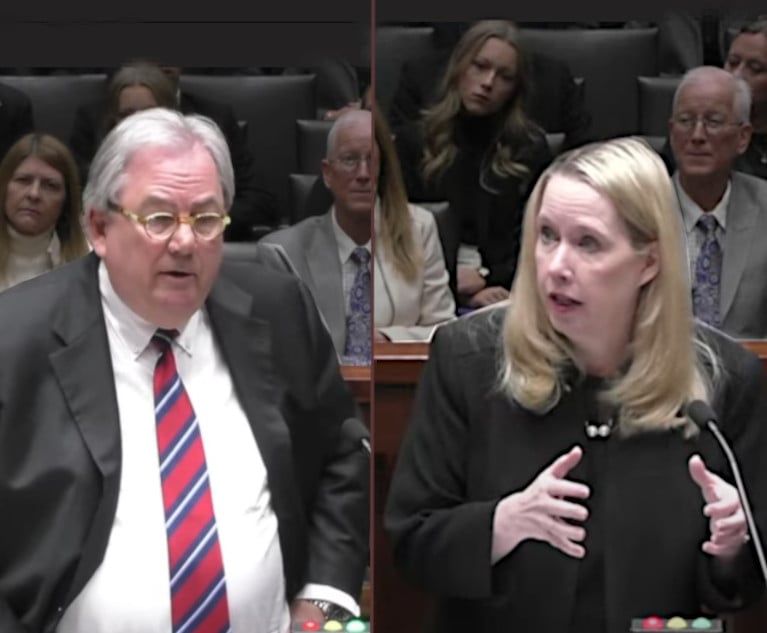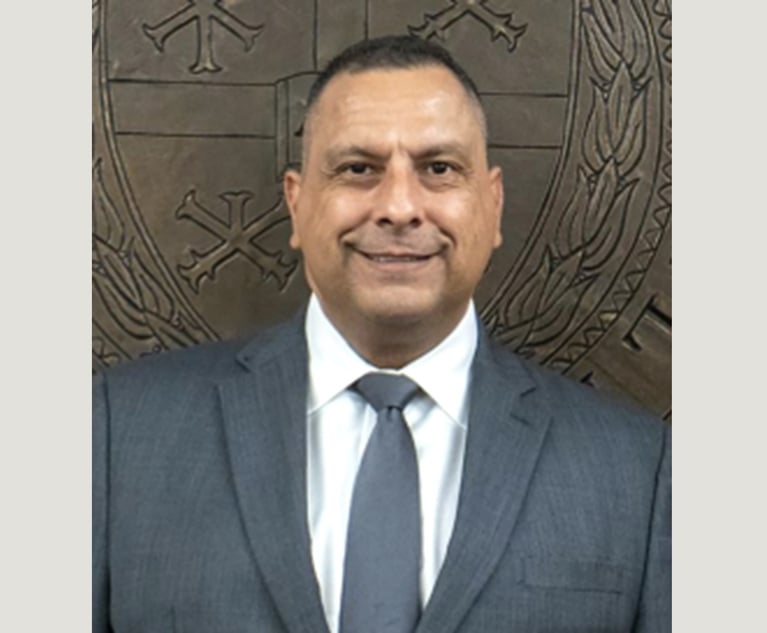Bar Pass Rates Are Up. Is the Worst Over?
New York, Florida, Pennsylvania, Illinois and Virginia are among the many jurisdictions celebrating higher pass rates on the July 2019 bar exam. But it's not certain if the results signal a larger turnaround in bar passage.
October 29, 2019 at 05:46 AM
3 minute read
The original version of this story was published on Law.com
 Photo: Shutterstock.
Photo: Shutterstock.
The six-year slide in bar exam pass rates looks to be at an end.
All but a handful of jurisdictions have thus far announced their results for the July 2019 exam, and the vast majority posted modest gains in their overall pass rates while a smaller number saw pass rate increases of 7% or more. That's a welcome change for legal educators, who have been trying for years to reverse the decline in bar passers.
"Up is the right direction," said Kyle McEntee, executive director of Law School Transparency. "For any schools that have figured out how to increase bar pass rates for their students most at-risk of failing the bar, I hope they share their methods far and wide for study."
New York saw its pass rate climb two percentage points, to 65%. Illinois' overall pass rate ticked up one percentage point, to 71%. Virginia's pass rate increased nearly two percentage points to land at 75% for the most recent exam. Pennsylvania's overall pass rate rose from 71% last year to 73% this July, while 73% of Ohio bar takers passed—up from 70% the previous year. In Massachusetts, more than 71% of July bar takers passed, up from 69% last year.
Florida reported one of the largest jumps, moving from a pass rate of 67% in 2018 to 74% this July—a gain of seven percentage points. Similarly, New Jersey saw its pass rate rise seven points to 66%. North Dakota this far looks to have notched the largest increase, at 10%. Fully 73% of takers passed in July, which University of North Dakota Law Dean Michael McGinniss has partly attributed to his school's efforts to bolster its bar prep and academic support programming.
The National Conference of Bar Examiners predicted higher pass rates in early September, when it revealed that the national average score on the Multistate Bar Exam—the daylong, multiple-choice portion of the exam—had increased 1.6 points from the previous year, which represented a 34-year low.
It's too soon to tell whether July's relatively stronger results represent the start of a sustained turnaround in national bar pass rates, according to Pepperdine University law professor Derek Muller. But it's a positive sign.
"As incoming student quality has improved over the last few years, we should expect bar pass rates to continue to improve, too," he said.
It remains to be seen whether California's dismal bar pass rate will improve this year. Scores are not scheduled to come out until Nov. 15, and many are eagerly awaiting to see what happens in the state. Just 41% of bar takers there passed last July, and bar leaders have come under increasing pressure to lower its exam cut score, which is tied with Delaware as the highest in the nation. Texas on Oct. 25 released the list of those who passed the exam, but bar officials have not yet released the overall pass rate and other exam statistics.
Some smaller jurisdictions did not fare as well on the July exam, however. Vermont's pass rate fell nine percentage points to 61% while Maine also saw a decline of four percentage points, landing at 52%. Idaho's pass rate fell from 69% in 2018 to 64% in 2019. Relatively few people took the exams in those three jurisdictions, however.
This content has been archived. It is available through our partners, LexisNexis® and Bloomberg Law.
To view this content, please continue to their sites.
Not a Lexis Subscriber?
Subscribe Now
Not a Bloomberg Law Subscriber?
Subscribe Now
NOT FOR REPRINT
© 2025 ALM Global, LLC, All Rights Reserved. Request academic re-use from www.copyright.com. All other uses, submit a request to [email protected]. For more information visit Asset & Logo Licensing.
You Might Like
View All

Case With 'Serious Consequences for Corporate Law' Heads to Texas Supreme Court
5 minute read

How Uncertainty in College Athletics Compensation Could Drive Lawsuits in 2025
Trending Stories
- 1M&A Transactions and AB 1824: Navigating New Privacy Compliance Challenges
- 2Devin Nunes, Former California GOP Congressman, Loses Move to Revive Defamation Suit
- 3Judge Sides With Retail Display Company in Patent Dispute Against Campbell Soup, Grocery Stores
- 4Is It Time for Large UK Law Firms to Begin Taking Private Equity Investment?
- 5Federal Judge Pauses Trump Funding Freeze as Democratic AGs Launch Defensive Measure
Who Got The Work
J. Brugh Lower of Gibbons has entered an appearance for industrial equipment supplier Devco Corporation in a pending trademark infringement lawsuit. The suit, accusing the defendant of selling knock-off Graco products, was filed Dec. 18 in New Jersey District Court by Rivkin Radler on behalf of Graco Inc. and Graco Minnesota. The case, assigned to U.S. District Judge Zahid N. Quraishi, is 3:24-cv-11294, Graco Inc. et al v. Devco Corporation.
Who Got The Work
Rebecca Maller-Stein and Kent A. Yalowitz of Arnold & Porter Kaye Scholer have entered their appearances for Hanaco Venture Capital and its executives, Lior Prosor and David Frankel, in a pending securities lawsuit. The action, filed on Dec. 24 in New York Southern District Court by Zell, Aron & Co. on behalf of Goldeneye Advisors, accuses the defendants of negligently and fraudulently managing the plaintiff's $1 million investment. The case, assigned to U.S. District Judge Vernon S. Broderick, is 1:24-cv-09918, Goldeneye Advisors, LLC v. Hanaco Venture Capital, Ltd. et al.
Who Got The Work
Attorneys from A&O Shearman has stepped in as defense counsel for Toronto-Dominion Bank and other defendants in a pending securities class action. The suit, filed Dec. 11 in New York Southern District Court by Bleichmar Fonti & Auld, accuses the defendants of concealing the bank's 'pervasive' deficiencies in regards to its compliance with the Bank Secrecy Act and the quality of its anti-money laundering controls. The case, assigned to U.S. District Judge Arun Subramanian, is 1:24-cv-09445, Gonzalez v. The Toronto-Dominion Bank et al.
Who Got The Work
Crown Castle International, a Pennsylvania company providing shared communications infrastructure, has turned to Luke D. Wolf of Gordon Rees Scully Mansukhani to fend off a pending breach-of-contract lawsuit. The court action, filed Nov. 25 in Michigan Eastern District Court by Hooper Hathaway PC on behalf of The Town Residences LLC, accuses Crown Castle of failing to transfer approximately $30,000 in utility payments from T-Mobile in breach of a roof-top lease and assignment agreement. The case, assigned to U.S. District Judge Susan K. Declercq, is 2:24-cv-13131, The Town Residences LLC v. T-Mobile US, Inc. et al.
Who Got The Work
Wilfred P. Coronato and Daniel M. Schwartz of McCarter & English have stepped in as defense counsel to Electrolux Home Products Inc. in a pending product liability lawsuit. The court action, filed Nov. 26 in New York Eastern District Court by Poulos Lopiccolo PC and Nagel Rice LLP on behalf of David Stern, alleges that the defendant's refrigerators’ drawers and shelving repeatedly break and fall apart within months after purchase. The case, assigned to U.S. District Judge Joan M. Azrack, is 2:24-cv-08204, Stern v. Electrolux Home Products, Inc.
Featured Firms
Law Offices of Gary Martin Hays & Associates, P.C.
(470) 294-1674
Law Offices of Mark E. Salomone
(857) 444-6468
Smith & Hassler
(713) 739-1250






